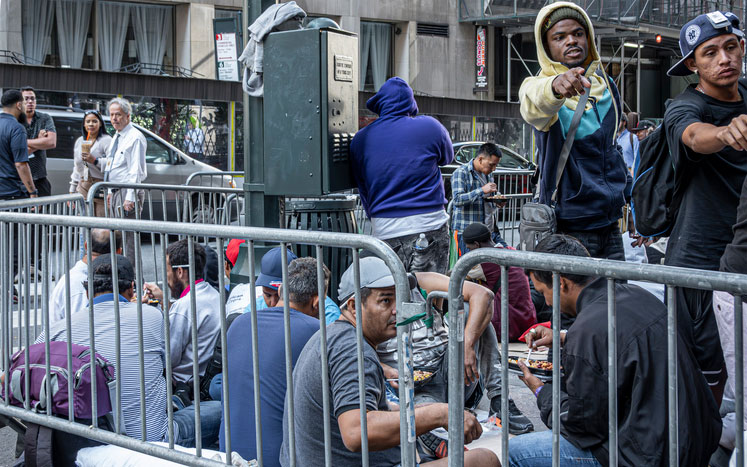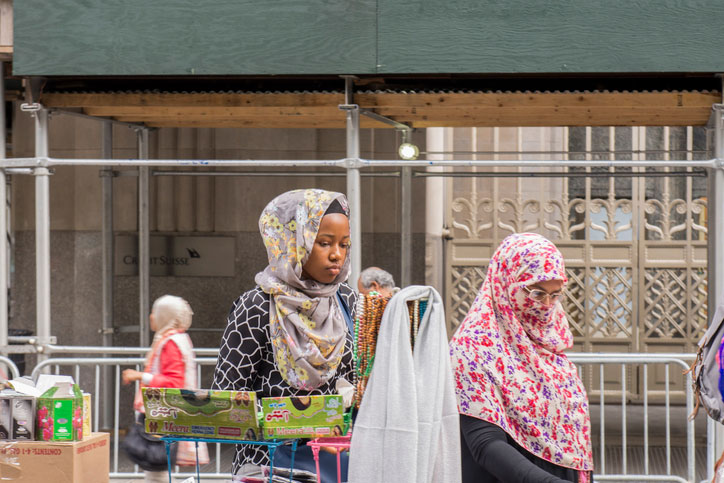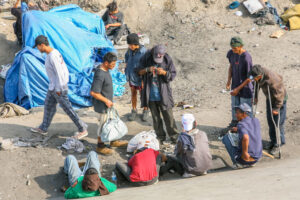Written by Scott Wilson

In a nation of immigrants, New York City is Mecca.
According to 2020 data from Pew Research, the United States had more immigrants than any other country in 2020, rising to nearly 14 percent of our population. But New York blows those percentages out of the water; the American Immigration Council found at the same time that nearly a quarter of New Yorkers are immigrants. On top of that, almost as many more New York residents have one or more parents who immigrated here.
The Top Five Countries of Birth Among New York Immigrants:
- Dominican Republic
- China
- Mexico
- Jamaica
- India
It’s a background that speaks to our diversity. There’s no one-size fits all immigrant experience—every story is unique, every need is personal.
New York residents live with at least one family member who is undocumented.
With pressure on both those populations come from every angle, social workers represent a warm welcome and an invaluable resource for people starting over in a strange land.
The Role of Social Work in Immigration and Asylum Work
Immigration social workers may be the first friendly face that people from other countries encounter when they enter the United States.
Everything that Americans take for granted about how society works, cultural cues, economics, and even language may be entirely new to someone arriving on our shores for the first time. It’s a profoundly disorienting experience.
Social workers can offer the orientation that new arrivals need to find their footing.
Some of the first challenges for many immigrants may be the immigration process itself. Intentionally convoluted, occasionally punishing, and profoundly unfair, it’s a system that requires a lot of explanation and unraveling. Social workers in this field have made a specialty out of understanding the regulations, unearthing the legal resources, and mastering the forms and filings required to legally enter the country.
Getting settled once in an entirely new place takes a lot of help. Immigration social workers are vital for helping new arrivals get plugged in to vital services like:
- Healthcare
- Education
- Transportation
- Shelter
- Employment
Without such vital services, immigrants are adrift. So social workers in this role prioritize getting access to such basic necessities of life.
Assimilation is also a consideration. Helping new arrivals through the inevitable culture shock and getting them acclimated to the rowdy and fast-paced New York style can be both challenging and fun. Whether it’s teaching English slang or explaining how an American grocery store works, you can both do some good and have some fun seeing the United States through the eyes of new arrivals.
Immigration Social Work Roles Contribute Both Directly and Indirectly To Making Better Lives for New Arrivals

While the trauma of being uprooted and traveling halfway around the world for an uncertain chance at safety and a better life is absolutely an area where social workers can offer crucial clinical care, there’s also a lot of paperwork and systemic considerations in immigration. So mezzo roles are common, too, helping people sort through applications that aren’t in their native languages, while helping them navigate shifting requirements of Code of Federal Regulations Title 8, Aliens and Nationality.
It takes a hopeful and resilient spirit for people to abandon belongings, families, and the familiarity of all they have ever known for a perilous journey to the United States.
As New York social workers are well aware from the epic protests that rocked the city during the Trump Administration Muslim ban in 2017, there’s also a lot of social justice work to be done at the highest levels of government and policy. New York is one of the best places in the world to rock that boat. With the United Nations hovering over in Turtle Bay and legendary organizations like the International Rescue Committee and HIAS at home here, macro-level social workers have a big impact on policy and immigration law.
Specialized MSW Degrees for Immigration Social Work Roles in New York
Immigration is a long-standing consideration for New York social work education, one of the oldest concerns the profession has here going all the way back to Ellis Island. So you will find a lot of institutional support for an education focused on serving refugees and immigrants in schools of social work here.
That finds expression in directly focused programs like a Master of Social Work Concentration in International Social Welfare for Immigrants and Refugees or a Master of Social Work Specialization in Global Social Work and Practice with Immigrants and Refugees.
These degrees dive into the hard parts of delivering social services to people from foreign societies who have landed on our shores. They come with coursework such as:
- Multicultural Social Work Practice
- International Social Welfare Policy and Services
- Services to Immigrants and Refugees
- Strengthening Communities
Immigrants are a large group, however, with many needs and interests. There are all the same divisions of populations within their ranks as there are with native-borne citizens. So it’s also perfectly possible to prepare yourself with specialized MSW concentrations in areas like:
- Individuals and Families
- Organization and Community
- Policy Practice and Advocacy
- World of Work
You can easily see how any of those areas of expertise can be applied in delivering immigration social services.

Adding the right electives can also be a big boost, regardless of specialization. You may find classes to prep you for work with particular subsets of immigrant populations, like Social Work and the Nation Community or Social Work with Victims of Violence.
Although not absolutely required, fluency in languages other than English is a major advantage in immigration and refugee social work.
Cultural empathy is clearly a must-have for social workers in immigration roles. Fortunately, and particularly at the master’s level, social work studies always come with some experiential learning.
This puts you out in active human services environments, putting your classroom skills into practice. That helps you hone your expertise under the watchful eye of professionals who have decades of experience working with immigrants.
New York offers a particularly rich environment for this kind of learning, with placements in organizations like the UN, the Ackerman Institute for the Family, the Asian Bicultural Center at Gouverneur’s Hospital, and the Charles B. Wang Community Health Center all on the table.
Immigration Assistance Roles Exist for Other Social Work Degrees as Well
With a lot of paperwork processing and general education and advising required for most immigrants, there are also many opportunities for graduates with only a Bachelor of Social Work, or even an Associate of Arts in Human Services: Community Service and Social Welfare to get to work with this population.
The liberal arts core of such degrees serves you well in making genuine connections with people from other cultures. The professionalism and expertise that even undergraduate degrees bring give you a leg up in navigating the complex systems for relief and immigration support.
What New York Organizations Support Jobs for Social Workers in Immigration and Asylum Roles
Unlike many other social work roles, which are easy to find and identify by specialty, many roles dealing specifically with immigrants and refugees in New York take a little more digging.
The Role of Social Work in the Modern Refugee Crisis
 Plenty of immigrants come to our shores from privileged backgrounds and first-world countries. India and China are two of the largest overall countries of origin; thirty-five percent hold at least a bachelor’s degree.
Plenty of immigrants come to our shores from privileged backgrounds and first-world countries. India and China are two of the largest overall countries of origin; thirty-five percent hold at least a bachelor’s degree.
But the ones who need social workers the most are those fleeing violence and oppression at home.
Many of these people are coming from conditions far worse than the worst that the American immigration system can throw at them. They may have been victims of genocide, of sexual violence and trafficking, awful epidemics like HIV/AIDS, or persecution as members of LGBTQ communities. The terrible trek to the border and the dangerous crossing is just part of the horror these people face.
Such people have a long road ahead of them to recovery even once they reach our shores. Social workers have a vital role to play in that effort. From ensuring that refugees have representation and understand their rights in immigration court to assisting them with the PTSD treatment and mental health counseling they need, it’s an enormous amount of work. It takes a village, and social workers are the big players in that village.
It’s impossible to work with such people and not come away with a belief that the world should be more just and more caring. So many social workers push at the refugee problem from the other end of the string. They are tireless advocates at both national and international forums, like the UN or the U.S. State Department, fighting for more assistance overseas to prevent the catastrophes that create waves of refugees in the first place.
From climate justice protests to marches against genocide, social workers do their best to keep people from becoming refugees in the first place. But when it happens, they also stand ready to get them back on their feet again in a new nation and a new home.
They are listed under more specific categories dealing with particular populations of immigrants. So, for instance, you will have more luck finding jobs working with immigrants from Asia by looking for social work roles with organizations that focus on that group. You’ll also find social work roles that primarily work with immigrant populations scattered in with various child and family, youth and young adult, or geriatric practice areas.
One key way to spot immigration social worker positions is that most are looking for applicants who are bilingual at a minimum.
Other times, harkening back to settlement houses that were some of the earliest social work efforts in the city, you’ll find positions with settlement societies or clinics that take on the same role in the modern era.
Charities, religious organizations, neighborhood associations, and education societies are other places to look for social work jobs focused on immigrant needs.
You may also find niche positions in healthcare, mental health, or retirement communities that have significant immigrant patient populations and need specialist social work assistance dealing with their unique needs.
No matter where you find your place, you’ll have the opportunity to see the world and our country through the eyes of other cultures. It’s a valuable experience for social workers that can be as informative and enriching as it is helpful for the people you serve.
